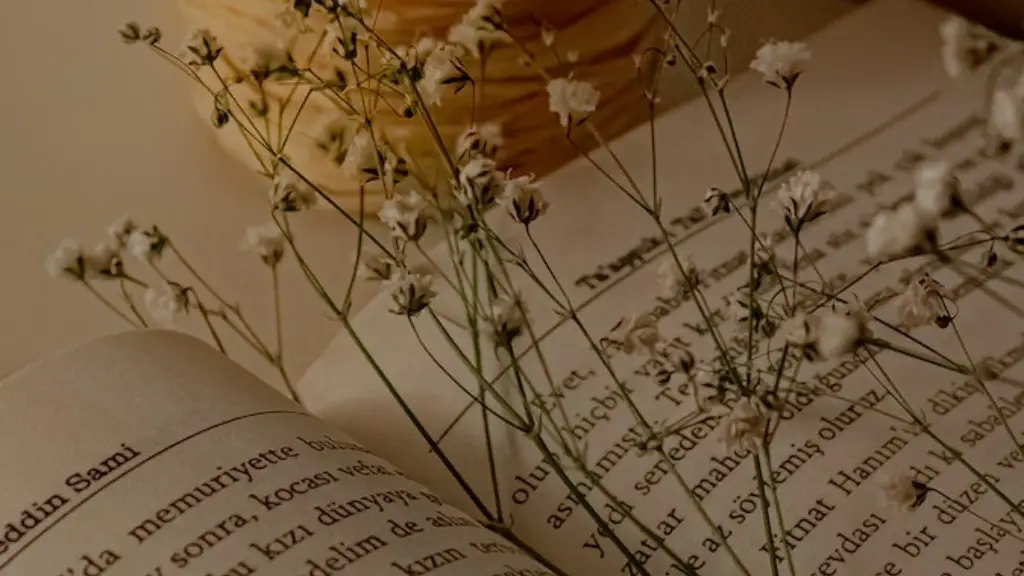Robert Frost was an iconic American poet, renowned for his works which focused on nature, rural life and his observations of the modern world. He published many poems in his career, some of the most famous examples being ‘The Road Not Taken’, ‘Stopping by Woods on a Snowy Evening’ and ‘Nothing Gold Can Stay’. These three examples are among some of the most widely recognised and studied poems. It is no exaggeration to say that Robert Frost’s works have had a significant impact on both traditional and contemporary poetry.
Frost’s work was often inspired by his New England countryside, which created a distinct contrast between the future he imagined and his nostalgia for the past. He often used poetical devices such as metaphor, imagery and irony to convey this contrast. His unique writing style that often focused on wide-open spaces has been described as ‘New England Romanticism’, with an emphasis on poetry as an expression of individual experience and emotion.
His poem ‘The Road Not Taken’ is perhaps the most famous of his works. This poem has been interpreted in many different ways, but one of the most popular understandings is that it conveys the message of staying true to oneself and making the right decision when faced with a difficult choice. This message of moral courage resonates with many, amongst them those facing life-altering decisions.
That said, other popular works by Frost include ‘Mending Wall’, ‘Fire and Ice’ and ‘Nothing Gold Can Stay’. In ‘Mending Wall’, Frost questions traditional customs and societal conventions, exploring the power of physical forces like winter and ice as opposed to human beings. He does this in a way that shows an understanding of human nature and prompts readers to take into account the impact of their own decisions.
Frost’s poem ‘Fire and Ice’ is a call for humanity to be sensible and cautious rather than driven by impulse and desire. This poem is a warning against destructive forces and conveys a cultural message of moderation in the face of strong emotion, through the analogy of fire and ice.
The poem ‘Nothing Gold Can Stay’ serves as a reminder to be mindful of the passing of time, as Frost draws on his own personal experiences to understand the beauty of life. Through this poem, he expresses his appreciation for the simplicity of nature and the importance of cherishing moments of beauty and serenity.
The Poetical Theme in Robert Frost’s Work
The poetical theme that characterises Robert Frost’s work is that of change. In effect, Frost shows his readers how to cope with the fluctuations of life in order to cultivate balance. He often uses nature to explore the delicate balance between life and death and how fleeting moments should always be celebrated.
In his poem ‘The Road Not Taken’, Frost questions whether we can make the right decisions in a world in constant flux, full of unknowns and opportunities. In ‘Mending Wall’, he acknowledges the value of community and how it can shape one’s decisions. He also evidences how modern-day exchanges of power and ideas can act as both a barrier and a bond to understanding one another.
In ‘Fire and Ice’, Frost warns us of the perils of being too impulsive and envisioning a result without fully understanding its implications. He conveys the idea of balance between the two forces and how civilization should be based around the idea of moderation.
When discussing life, Frost often conveys the idea of nothing being forever and how the beauty of life should be embraced and celebrated. This idea is highlighted in his poem ‘Nothing Gold Can Stay’, which shows the poet’s acute awareness of the finite nature of life and how he treasures every moment. In this way, Frost captures the depth of life and its fragility with his art.
Frost’s poem ‘Stopping by Woods on a Snowy Evening’ illustrates a peacefulness in nature and an appreciation for beauty in the moment. The poem conveys a spiritual contentment in the natural world, an idea which Frost was deeply invested in and one that he expressed often in his work.
The Literary Devices Used in Robert Frost’s Poems
In Robert Frost’s works, he often employs a range of literary devices to explore the themes of individual experience, nature, and the beauty of life. He utilises imagery, metaphor, and irony to effectively convey his ideas and his love of language is evident in his writing.
For example, in the poem ‘The Road Not Taken’, Frost uses metaphor to explore the notion of individual experience. He reflects on the idea that although the reader might have been in the same situation as him, the decision and outcome would not have been the same; it would have been unique to each individual.
In ‘Mending Wall’, he uses irony to call into question traditional customs and societal conventions. He does this by questioning whether physical forces like winter and ice are more powerful than human beings. By asking this, he conveys the futility of our everyday human conventions and allows us to ponder the power of physical forces.
Frost also used prepositions to amplify his writing. In ‘Nothing Gold Can Stay’, he uses words like ‘sweet’, ‘wild’ and ‘green’ to show the beauty of nature, illustrating how fleeting moments should be appreciated. By using a subtle yet effective mix of words, he is able to set the tone of the poem and convey the beauty of the season.
In ‘Fire and Ice’, Frost employs metaphor to warn against strong emotion and impulsiveness. Through this poem, he conveys the idea of moderation in the face of strong emotion. He equates fire with desire and ice with hatred, demonstrating how destructive desire can be if unchecked.
The Significance and Legacy of Robert Frost’s Poems
The significance and legacy of Robert Frost’s poems are vast, with his works having a notable impact on both traditional and contemporary literature. His message of moral courage, moderation and his appreciation for the beauty of nature have immortalised in his verses and touched the hearts of generations of readers.
Frost’s work has been studied and interpreted in various ways, with the poem ‘The Road Not Taken’ being the most popular example. This poem has been widely recognised for its message of individual decision-making and courage in the face of tough decisions. It has been discussed in literature circles and classrooms across the world and is a recurrent theme in popular culture.
Other noteworthy poems by Frost like ‘Fire and Ice’, ‘Mending Wall’ and ‘Nothing Gold Can Stay’ have also been thoroughly researched, interpreted and discussed. Thought-provoking messages such as the balance of humanity and physical forces, appreciation of community and understanding of the passing of time can be found in Frost’s work and these ideas have been integrated into popular culture.
To this day, Robert Frost’s legacy lives on; his works are a timeless reminder of the importance of contemplation, courage and appreciation in our lives. This can be seen in a range of literature, film, television and other art forms today.
The Impact of Robert Frost on Contemporary Poetry
The impact of Robert Frost on contemporary poetry is undeniable. His modern and experimental writing style has provided a foundation for contemporary poets to explore similar themes of individual experience and nature.
The idea of making a difficult choice, explored in the poem ‘The Road Not Taken’, has been a recurring theme in contemporary literature. It has been popularised in books, song lyrics, television shows, and even in film. This idea has been passed down through different generations and Frost’s work has served as an inspiration for many modern poets.
The themes of community and moderation explored in ‘Mending Wall’ and ‘Fire and Ice’ respectively, have also been discussed in contemporary literature. In popular culture, these themes of understanding one another and being sensible in our actions, have been explored in many art forms.
Finally, other common themes in Frost’s work, such as the appreciation of nature illustrated in ‘Nothing Gold Can Stay’ and the contentment of being in the moment depicted in ‘Stopping by Woods on a Snowy Evening’, have found their way into contemporary literature. Such ideas of living in the here and now, and acknowledging the beauty of life, have been explored in many recent works of literature.
The Reception of Robert Frost’s Poems
Since being published, Robert Frost’s poems have been met with critical acclaim and have achieved a level of international recognition. He was the recipient of several literary awards and achieved a number of literary accomplishments in his career.
His work has been praised for its subtle yet effective language, use of imagery and its exploration of timely topics. His ubiquity in literature and his mastery of rhetoric have also been praised.
Frost was awarded the Pulitzer Prize four times for his collections of poetry, considered one of the greatest literary accolades of all time. In addition, he was awarded the Congressional Gold Medal, an honour bestowed on individuals who have made exceptional contributions to their respective field.
Although the reception of Frost’s work has been generally positive, some criticisms have been voiced. Many believe that his works are too accessible and lack deeper insight, while others believe he did not take risks with his works. Regardless of these criticisms, Frost’s poetry remains a timeless staple in literature and a source of inspiration for generations of readers.





